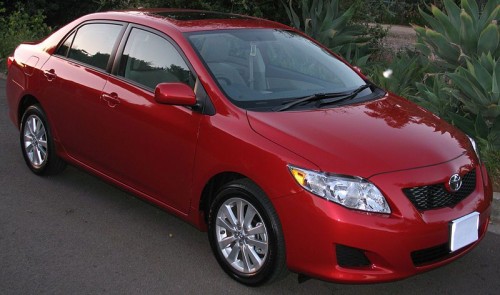A Times B Times C
 Toyota Motor Corporation announced a safety recall of several million vehicles that have problems with sticking gas pedals causing acceleration.
Toyota Motor Corporation announced a safety recall of several million vehicles that have problems with sticking gas pedals causing acceleration.
Until recently, corporate executives argued that consumer complaints about sudden acceleration were related to floor mats which were recalled in 2007. However, corporate executives were aware of problems with sticking gas pedals three years ago – according to a filing with federal regulators.
United States Transportation Secretary Ray LaHood contends that corporate executives stopped selling and producing their vehicles with faulty gas pedals “because we asked them to.” In contrast, corporate executives state that they voluntarily stopped sales and production. If the latter is true, why did corporate executives wait so long to initiate the recall?
In the movie Fight Club, the narrator states: “Should we initiate a recall? Take the number of vehicles in the field, A, multiply by the probable rate of failure, B, multiply by the average out-of-court settlement, C. A times B times C equals X. If X is less than the cost of a recall, we don’t do one.”
Corporate executives seek to minimize costs and maximize profits. For Toyota’s corporate executives, perhaps X was less than the cost of repairing millions of faulty parts on vehicles.
Recently, lawsuits accumulated against Toyota Motor Corporation. According to Robert Hilliard, an attorney filing a class-action lawsuit in the United States: “Toyota has long known about the defect with their throttle control, and has done too little, too late to correct it.”
Additionally, the media reported several fatal crashes involving sticking gas pedals causing sudden acceleration. These news reports threatened to tarnish Toyota’s reputation. With increasing financial payouts and damaging news accounts, perhaps X increased dramatically – thereby encouraging corporate executives to initiate the recall of faulty vehicles.


















1540-6210/asset/society_affiliation_image.gif?v=1&s=812a48e1b22880cc84f94f210b57b44da3ec16f9)
1540-6237/asset/SSSA_Logo-RGB.jpg?v=1&s=c337bd297fd542da89c4e342754f2e91c5d6302e)
What seemed unexpected to me about this recall was the fact that when the announcement was made initially, there was no known solution for the problem at hand. I realize that mechanics can be inexact (as is the case with any scientific endeavor). However, it seems that the method of handling the recall also caused X to increase dramatically as troubled owners were left to wonder and wring their hands.
Interestingly, one economist noted that recalls can be financial boons for dealers if car owners purchase additional services at the time of the recall–I wonder if that is the case for Toyota this time around?
Keri